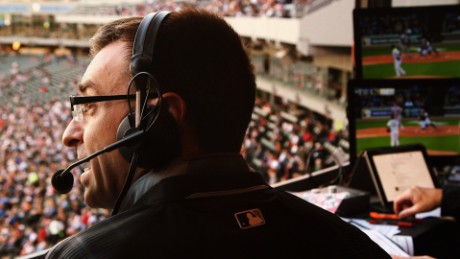
(CNN)Jason Benetti was in elementary school when his teacher asked him to write an essay.
“The assignment was, ‘I wonder what I’ll be in 20 years,'” he recalled.
“I would like to be the White Sox sportscaster. As long as I don’t look like Harry Caray,” the boy wrote, referencing the famed voice of the Chicago Cubs.
Benetti’s childhood dream came true in January, when the 32-year-old was hired by the Chicago baseball team to be the TV play-by-play announcer. But it’s a dream that almost never happened.
Benetti was born 10 weeks premature. His mom and dad weren’t sure whether they would be able to bring him home from the hospital.
“I know how difficult it was on my parents to know it’s touch and go at that point, whether or not I’m gonna make it,” he said.
Benetti made it out of the hospital and was later diagnosed with cerebral palsy, a neurological disorder that affects muscle coordination, movement and balance.
“Essentially, it led to a couple different surgeries: eye surgery, heel cord surgery, hamstring surgery,” he said.
“Sometimes, I would show up after summer break [in elementary school] in a wheelchair or in a cast or in those ‘Forrest Gump’-like inserts that don’t actually just fly off your legs like in the movie,” he joked.
Eventually, Benetti was able to stop wearing orthotic inserts in his shoes. By high school, he was playing first chair tuba in the band.
“Part of being in band was being in marching band … However, I would have toppled over had I worn the [tuba]. I didn’t have the strength for that and the coordination for it either,” he recalled.
The band director tried to make it work.
“They started by putting a tuba on the stand, and the entire band was going in orbit around me,” he said. “So the band director said, ‘Look, this is not a good idea. Why don’t you be the announcer for our sets?’ “
Benetti was a natural. The opportunity helped him land a gig with his high school radio station.
“We gravitate towards the things we’re good at,” he said.
Benetti went on to graduate from Syracuse University with bachelor’s degrees in broadcast journalism, economics and psychology and earned a law degree from Wake Forest University.
He worked a long list of sports announcing jobs to make a name for himself, including serving as the lead announcer for the Syracuse Chiefs Minor League Baseball team and covering various sports for ESPN.
“When I started doing TV, there was a worry of, will people want me on TV because I can’t look directly into the camera,” he recalled.
Benetti has a lazy eye and walks with a slight limp.
“I actually forget how I walk until I walk past a mirror. And then I think, ‘Why did we invent mirrors?’ ” he joked. “There were some hurdles there, and people helped me get through it. Now, it’s really not an issue.”
Benetti said the way cerebral palsy affects him today is perception.
“If I walk into a room and people don’t know me, there might be a belief, still: ‘Hey, can he do this? Can he do that?’ The hope is that we get to a time where people are thinking first, ‘What can this person do?’ not ‘What help do they need?’ ” he said.
Benetti’s cerebral palsy never came into play when the White Sox were hiring.
“We knew he wasn’t going to win any speed racing contests when we interviewed him,” joked Brooks Boyer, the team’s senior vice president of sales and marketing.
Boyer said he spoke with close to 100 people in the broadcasting world to find the right announcer.
“I asked many of them, ‘Give me your top three young broadcasters, guys that have earned a shot at being in the big leagues.’ And Jason Benetti was on every single one of those people’s lists,” he said.
Seasoned announcer Steve Stone is Benetti’s partner in the booth.
“He’s very intelligent,” Stone said. “The best thing about him is he has a wonderful sense of humor.”
“I think the only thing that really aggravates him is when people treat him in a different manner because he has CP,” he added. “Everybody has something. He happens to have this, but it hasn’t stood in the way of anything he’s ever accomplished. I don’t think he views himself as an inspiration, but he truly is.”
“If I can help an employer look past somebody else’s disability, that’s of great value to me,” Benetti said. “If I can help a person do something tomorrow that they didn’t do today, that’s what I want to do.”
Read more: http://www.cnn.com/2016/07/07/health/turning-points-jason-benetti/index.html

